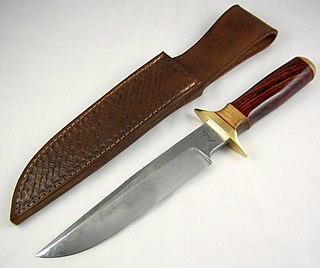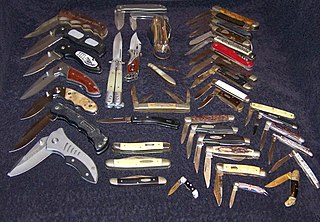Jackknife may refer to:
Contents
- Pocketknife or jackknife, a compact, foldable knife
- Jackknife Bar, Portland, Oregon, U.S.
- Jackknifing, a type of crash with articulated vehicle combinations
Jackknife may refer to:

A knife is a tool or weapon with a cutting edge or blade, usually attached to a handle or hilt. One of the earliest tools used by humanity, knives appeared at least 2.5 million years ago, as evidenced by the Oldowan tools. Originally made of wood, bone, and stone, over the centuries, in step with improvements in both metallurgy and manufacturing, knife blades have been made from copper, bronze, iron, steel, ceramic, and titanium. Most modern knives have either fixed or folding blades; blade patterns and styles vary by maker and country of origin.
Stop may refer to:

The chelicerae are the mouthparts of the subphylum Chelicerata, an arthropod group that includes arachnids, horseshoe crabs, and sea spiders. Commonly referred to as "jaws", chelicerae may be shaped as either articulated fangs, or as a type of pincers. Some chelicerae, such as those found on nearly all spiders, are hollow and contain venom glands, used to inject venom into prey or a perceived threat. Both pseudoscorpions and harvestmen have additional structures on their chelicerae that are used for grooming. In Paratrechalea, males and females have shown to have a chelicerae dimorphism, because the chelicerae is used as a mating signal for females.
Jack may refer to:
Jacob's Ladder is a staircase to heaven from a dream of Jacob described in the Old Testament.

A pocketknife is a knife with one or more blades that fold into the handle. They are also known as jackknives (jack-knife), folding knives, EDC knife, or may be referred to as a penknife, though a penknife may also be a specific kind of pocketknife. A typical blade length is 5 to 15 centimetres.

The JackknifeBascule Bridge is a bascule bridge that spans the Kaministiquia River at Thunder Bay, Ontario, Canada, to link the city to Mission Island, one of two islands in the Kaministiquia River delta. The bridge was built by the Canadian Pacific Railway between August 1910 and April 1913. The contractor for the abutments and piers was Alexander Charles Stewart (1867–1944). The bridge had two decks, the lower deck for trains and the upper deck for vehicular road traffic.

Jackknifing is the folding of an articulated vehicle so that it resembles the acute angle of a folding pocket knife. If a vehicle towing a trailer skids, the trailer can push the towing vehicle from behind until it spins the vehicle around and faces backwards. This may be caused by equipment failure, improper braking, or adverse road conditions such as an icy road surface. In extreme circumstances, a driver may attempt to jackknife the vehicle deliberately to halt it following brake failure.

Ensis is a genus of medium-sized edible saltwater clams, littoral bivalve molluscs in the family Pharidae. Ensis, or razor clams, are known in much of Scotland as spoots, for the spouts of water they eject while burrowing into the sand, when visible at low tide. This term may also colloquially include members of the genus Solen. Ensis magnus are known as bendies due to their slightly curved shell.
Crib may refer to:

The Knife were a Swedish electronic music duo from Gothenburg, formed in 1999. The group consisted of siblings Karin and Olof Dreijer, who together also run their own record company, Rabid Records. They gained a large international following in response to their 2003 album Deep Cuts.
In statistics, resampling is the creation of new samples based on one observed sample. Resampling methods are:
Cutter may refer to:

Bradley Efron is an American statistician. Efron has been president of the American Statistical Association (2004) and of the Institute of Mathematical Statistics (1987–1988). He is a past editor of the Journal of the American Statistical Association, and he is the founding editor of the Annals of Applied Statistics. Efron is also the recipient of many awards.
A jumping jack is a physical exercise, also known as a star jump in the UK.
The crooked knife sometimes referred to as a "curved knife", "carving knife," or "mocotaugan," from the Cree term "môhkotâkan," is a woodworking knife, typically with a curved end. The crooked knife is a common tool found amongst the native Americans of the Eastern Woodlands as well as non-native woodworkers. The crooked in "crooked knife" refers to its unusual shape with the handle set at an oblique angle to the blade. The blade can be straight or curved, long or short and can be made of a steel forged specifically for the knife, or from reused hardened steel from another source. The shape of the blade, whether curved or straight, is a function of the carving purpose of the user: straight for whittling wood, making splints for baskets and incising, curved for hollowing out bowls and masks and ladles, as well as myriad other usages.

In statistics, the jackknife is a cross-validation technique and, therefore, a form of resampling. It is especially useful for bias and variance estimation. The jackknife pre-dates other common resampling methods such as the bootstrap. Given a sample of size , a jackknife estimator can be built by aggregating the parameter estimates from each subsample of size obtained by omitting one observation.

Boy A is a 2007 British drama film directed by John Crowley, from a screenplay by Mark O'Rowe, based on the 2004 novel of the same name by Jonathan Trigell. The film stars Andrew Garfield in his film debut as Jack Burridge, who is re-entering society under a new name in Manchester after having served 14 years in a juvenile prison; and Peter Mullan as Terry, Jack's caseworker. The novel is noted for similarities to the James Bulger case, whose offenders were released around the time of its publication.

Song is a 1928 British-German silent drama film directed by Richard Eichberg and starring Anna May Wong, Heinrich George and Mary Kid. It was made at the Babelsberg Studio, based on the story "Dirty Money" by Karl Vollmöller. The film's sets were designed by Willi Herrmann.